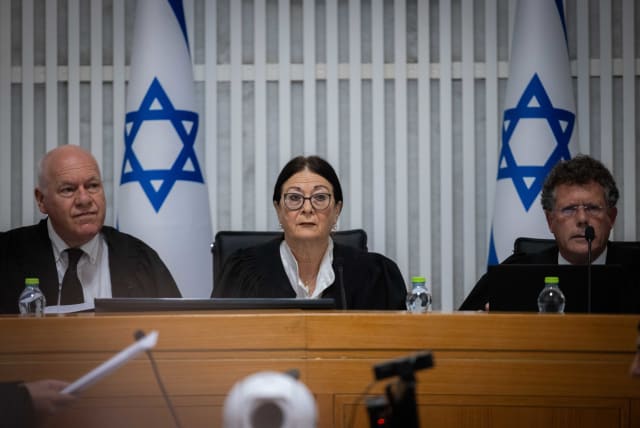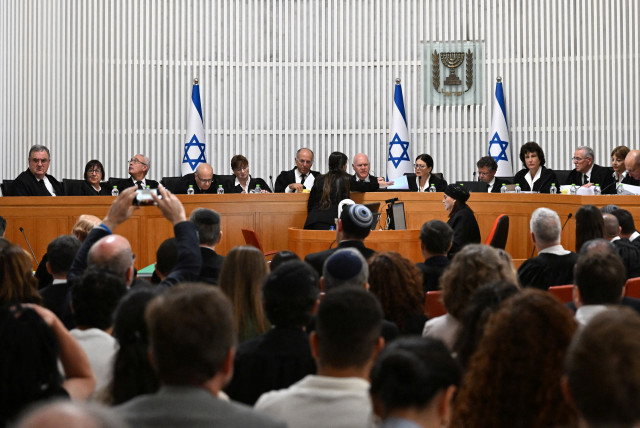Today's political debate over the judiciary is crucial to our future - opinion

The gift of the founding generation must not be squandered.
The Declaration of Independence is a capsule of refined Israeli DNA that the state’s founding generation implanted in the national bloodstream as a gift to the generations to come. Will this gift survive the current generation? Will our children benefit from its great healing spirit? There is a fear that in the destructive process we are going through, this chipping away of our self-worth, the singular value of the Declaration will be lost. Its margins have already been scorched by the fire of dispute.
How will we save the Declaration?
Israelis do not share the same view regarding the interpretation of our past, the meaning of the present, and most importantly, a befitting vision of the future. We live in a country without agreed-upon borders, where the political system is not anchored by a constitution, and there is no full bill of human rights.
In Israel, there is no hegemonic identity group (demographic or ideological) and the cultural fault lines run deep. In a reality built atop shifting sands, there is a great existential need to cleave to a stake of agreement that can unite us – and the only thing that comes close is the Declaration of Independence.
The Declaration is a canonical Israeli text – unparalleled. For years, Israelis understood the near-miraculous significance of the broad consensus achieved by the leaders of the Yishuv. In the moment of the state’s establishment, when its very existence was in question, they succeeded in creating, with words, the Israeli spirit – the spirit of a Jewish people reborn in its homeland. The Declaration tells our story at the decisive turning point when the Jewish people returned to history as a “nation.”
It is against this background that the grotesque spectacle in the court hearings regarding the reasonableness clause should be judged – the “assassination” attempt on the Declaration in the Supreme Court, during the most important legal hearing ever.
The one seeking to execute the Declaration was none other than a representative of the Israeli government. The most nationalist government in our history chose to argue against the Declaration’s legitimacy because it was drafted – so he claimed – in haste by an unrepresentative group and is now just a stale anachronism. How much cultural and social blindness is required to lay this sacred secular document as a sacrifice on the altar of dispute over the reasonableness law?
The assassination attempt was a backlash against an intellectual-judicial move seeking to use the Declaration as a “tiebreaker,” a legal instrument that justifies the judicial review of Basic Laws. A few years ago, during the debate on the constitutionality of Basic Law: Israel – the Nation-State of the Jewish People, I came out against this move and anticipated that the “judicialization” of the Declaration would lead to claims that it is “anachronistic and […] not an appropriate basis for management of the state’s affairs.”
I expressed concern that the Declaration’s “educational and cultural value as the foundational document of Israel as a Jewish and democratic state [would be] diluted.” Unfortunately, that gloomy forecast is coming true.
Saving the Declaration of Independence
THOSE WHO wish to preserve the Declaration’s elevated position, above the fray of the Israeli culture war, must recognize the distinction between two types of discourse: a discourse of identity and a discourse of rights. The Declaration should be employed in the first of the two – as an instrument that consolidates identity.
It is the home port of identity for Israelis, from which they depart on voyages through the stormy seas of controversy, and to which they return together for a night’s rest. Its success in fulfilling its historic role depends on whether it can harness broad emotional and intellectual popular support.
But this support cannot exist if the Declaration turns from an identity-defining, canonical text into a legal argument defining rights. Dragging the Declaration into a discourse of rights will damage it, as such discourse is conducted via judicial decisions, in which there are winners and losers. When one side seeks to overpower the other by relying on the Declaration, the opponent is obliged to denigrate the document’s importance, thereby diluting its value as a common identity asset.
The Israeli conversation tends to place itself within the discourse of rights and abandon the discourse of identity. We choose to shift the center of gravity of cultural disputes from the public sphere – ideology, politics, and the marketplace of ideas – to the judicial sphere where decisions are handed down. This is the context behind the growing trend of casting the Declaration as a doomsday weapon in the discourse of rights. Those who cherish the Declaration must oppose this.
The debate over the judicial review of Basic Laws is critically important for our future, but it must not be decided based on the noble text of the Declaration of Independence. The gift of the founding generation must not be squandered.
The writer is president of the Jewish People Policy Institute (JPPI) and a professor of law (emeritus) at Bar-Ilan University.
Jerusalem Post Store
`; document.getElementById("linkPremium").innerHTML = cont; var divWithLink = document.getElementById("premium-link"); if (divWithLink !== null && divWithLink !== 'undefined') { divWithLink.style.border = "solid 1px #cb0f3e"; divWithLink.style.textAlign = "center"; divWithLink.style.marginBottom = "15px"; divWithLink.style.marginTop = "15px"; divWithLink.style.width = "100%"; divWithLink.style.backgroundColor = "#122952"; divWithLink.style.color = "#ffffff"; divWithLink.style.lineHeight = "1.5"; } } (function (v, i) { });

